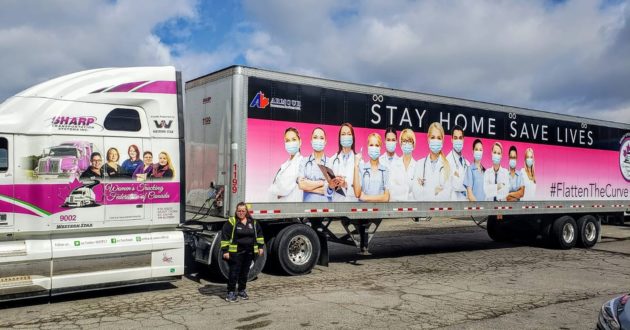CAMBRIDGE, Ont. – Shelley Uvanile-Hesch is back on the road, even if the message on the side of the truck driver’s trailer is imploring Canadians to stay home.
The message is clear. “Stay Home. Save Lives.” The masked medical personnel pictured on the vehicle wrap stare out into traffic to punctuate the point.
The load inside, however, has to roll in its own effort to “#FlattenTheCurve”. The shipment of hand sanitizer has been produced by one of the fleet’s existing pharmaceutical customers, destined for Burnaby, B.C. by way of Saskatoon. It’s being moved by Sharp Transportation at no cost.
“It’s good to be part of trying to help,” says Sharp president Shawn Baird.
The trailer wraps are meant to offer another sign of support. Another three reefers will be wrapped in similar messages in coming weeks.
“We’re all kind of making it up as we go.”
– Shawn Baird, Sharp Transportation
The Cambridge, Ont. fleet faces financial struggles like most other businesses these days. Its temperature-controlled loads of pharmaceutical products from the Mideast and Europe have recently trended higher, but work in the van division – especially the units that would normally carry high-end office furniture – has come to a standstill.
“Backhauls are pretty few and far between right now,” Baird admits. When the truck reaches B.C., it will likely re-position equipment like plywood pads and load bars on the return journey. “That means we have zero revenue in both directions, which we’re getting used to.”
The challenges don’t end there. One Sharp driver is currently being treated as a presumptive-positive case of Covid-19, and is under a quarantine. The truck is quarantined, too. Two other drivers have recently shown symptoms of the virus, but one of them recently tested negative.
“We’re all kind of making it up as we go,” Baird says, referring to steps the fleet has been taking in the days of a pandemic. It’s not like the Harvard School of Business created a manual or cheat sheet to deal with times like this.
As Uvanile-Hesch hits the road today, she’s frustrated that many Canadians are not yet doing their part.
“If you knew anyone in healthcare, you’d realize the importance of having to stay home.”
– Shelley Uvanile-Hesch, Sharp Transportation
“It’s quite obvious people aren’t getting it,” she says. Yes, highways are quieter, but she doesn’t think they’re nearly as vacant as they were in the early days of self isolation. Then there are the news reports about kids having a house party in nearby Brampton; the tweet from Ontario Provincial Police showing dozens of people in a dog park.
“I mean, c’mon … If you knew anyone in healthcare, you’d realize the importance of having to stay home. Up until this, other to go out and get groceries, I haven’t left my house.”
As an essential worker with essential cargo, she’s back on the road now.
It’s the first load she’s taken since the death of her husband and co-driver in a yard accident on Aug. 18. But in the months since then Uvanile-Hesch has focused her energy on the Women’s Trucking Federation of Canada, a grassroots organization that she founded and continues to lead.
On this trip she hopes to help draw more attention to what truck drivers experience in the days of Covid-19 and during typical workdays for that matter.
“The vast majority of drivers are out here doing what they do every day,” she says. “There’s just a higher risk now.”
Uvanile-Hesch feels pretty good about the thought of hauling a critical supply in the fight against the virus. Wash your hands. When soap and water are not available, use the hand sanitizer if you can find any. But that still reminds her of the stories of price gouging in selected truck stops, where palm-sized bottles of sanitizer are priced at $16.99, and larger bottles are offered at $40.
She’s also frustrated by reports of grocery stores that won’t allow drivers inside if they admit to being out of the country within the past 14 days. Truck drivers are largely self isolating because of the nature of the job, after all.
And for every story of support for truck drivers, she hears another about a fleet that limits access to basic facilities like washrooms. Where one truck stop hands out free coffee, another closes access to the showers.
The general public seems more aware of the work that truckers do these days. She just wonders whether that will continue after the pandemic, of if things will quickly switch back to the way they were.
“We can only hope that it changes things.”


